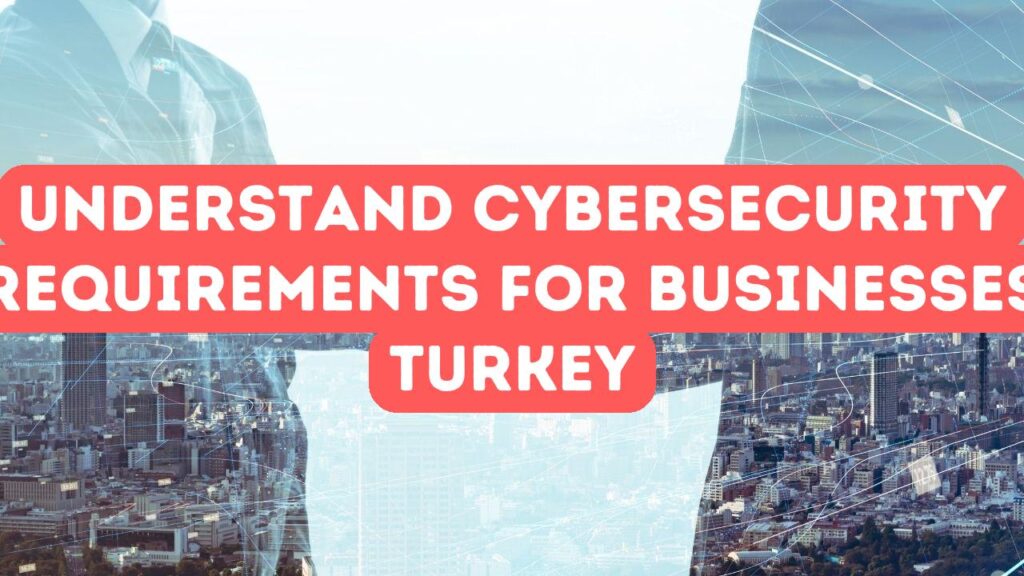In today’s digital age, understanding cybersecurity requirements is crucial for Turkish businesses. The growing landscape of cyber threats poses serious risks to data protection in Turkey. Navigating business security requirements can feel like walking a tightrope. One misstep can lead to significant losses. Cybersecurity Turkey demands more than just basic knowledge; it requires a proactive approach to cyber risk management. Consider this: a data breach isn’t just inconvenient. It can devastate a company’s reputation and financial stability. Turkish businesses need robust strategies to safeguard their assets. Yet, achieving this isn’t as daunting as it seems. By focusing on thorough cyber risk management, businesses can strengthen their defense against potential threats. Addressing cybersecurity requirements is not just about compliance. It’s essential for the longevity and credibility of businesses in Turkey. As you delve into this critical area, you’ll discover the true value of robust data protection Turkey strategies.
Navigating Compliance: Key Cybersecurity Regulations in Turkey
Turkey’s intricate web of regulations can feel like an uphill battle for Turkish businesses. When it comes to cybersecurity Turkey, compliance is more than just a checkbox. The Personal Data Protection Law (KVKK) stands as a pillar in this journey. It’s like having a manual guiding you through the stormy seas of data protection Turkey. By understanding business security requirements, you achieve more than just legal compliance. You’re actively participating in cyber risk management. It’s akin to building a fortress around your vital business information. Mistakes can turn pricy; therefore, knowing these regulations is crucial. More than red tape, these laws shield against breaches and bolster trust. So, for Turkish businesses, embracing these guidelines is paramount. They aren’t barriers; they’re stepping stones to a more secure business landscape. Skipping a step could lead to unforeseen repercussions, underlining their significance in safeguarding your enterprise.
Turkish businesses venturing into the digital realm must familiarize themselves with pivotal regulations that define cybersecurity Turkey. Key among these is the Regulation on the Processing and Protection of Personal Data in the Electronic Communication Sector, safeguarding sensitive data within telecommunications. Ignorance of such laws isn’t bliss; it’s a peril. Beyond this, the Law on Electronic Signature adds another layer, ensuring the authenticity of electronic transactions. Business security requirements are not just hurdles; they’re integral to maintaining trust in digital engagements. Compliance isn’t merely about adhering to rules; it’s about fortifying defenses against potential data breaches. Effective cyber risk management paves the way for resilience against increasingly complex cyber threats. For Turkish businesses, adapting to these regulations isn’t optional; it’s a necessity for thriving in the fast-paced digital world. Properly addressing data protection Turkey considerations ensures not just compliance, but also a solid foundation for sustainable growth.
Addressing compliance in cybersecurity Turkey is akin to laying a foundation for your business. The Regulation on Data Protection and Privacy in Electronic Payments is a cornerstone for Turkish businesses, bolstering the security of online transactions. Missteps here could cost dearly. Thus, understanding these business security requirements is essential. This regulation complements the Law on the Protection of Personal Data (KVKK), ensuring that organizations handle user information with care. Cyber risk management here is not an option; it’s a duty. By adhering to these regulations, businesses aren’t just ticking boxes—they’re cementing their reputation as trustworthy enterprises. It’s a dance of precision and caution, vital for data protection Turkey. Additionally, legislation relating to Information and Communication Technologies Authority (ICTA) sets the stage for a secure digital workspace. For Turkish businesses, these rules do more than ensure compliance—they are fundamental in shaping a resilient defense framework.
Essential Cybersecurity Strategies for Local Enterprises
For Turkish businesses, implementing essential cybersecurity strategies is like fortifying a digital fortress. In the heart of securing enterprise operations lies cybersecurity Turkey. With cyber threats lurking at every corner, having a sturdy shield is paramount. The first step in this digital defense? Understanding business security requirements that protect sensitive data. This isn’t just a mundane task; it’s a proactive journey of safeguarding your business’s future. By prioritizing cyber risk management, businesses can effectively counteract unauthorized access and data breaches. These breaches are more than a threat—they’re like a ticking time bomb to finances and reputation. Data protection Turkey strategies serve as a strong backbone, providing resilience and trust in the digital world. Every measure taken is a step toward ensuring business longevity. Don’t just meet the requirements; exceed them with confidence and clarity. This is the key to advancing Turkish businesses in today’s digital landscape.
In the landscape of Turkish businesses, crafting essential cybersecurity strategies is akin to building a shield against invisible adversaries. Cybersecurity Turkey, a cornerstone for local enterprises, must address diverse business security requirements to fend off potential cyber attackers. It’s a bit like installing a state-of-the-art alarm system in your digital house—protection must be multi-layered and precise. Ignoring cyber risk management can lead to breaches appearing out of thin air. For data protection Turkey, firms must keep a keen eye on new cybersecurity protocols and threat intelligence reports. Think of them as weather forecasts that warn about upcoming storms. Regularly updating firewalls, conducting security audits, and training employees are fundamental actions to bolster cybersecurity defenses. This approach not only guards sensitive data but also builds trust, critical for client relations and business partnerships. By undertaking cybersecurity measures wholeheartedly, Turkish businesses can confidently stride forward, armed against the digital unknown.
Navigating the landscape of Turkish businesses involves embracing robust cybersecurity strategies tailored to local needs. Cybersecurity Turkey isn’t just a buzzword; it’s a lifeline. Businesses must adapt by focusing on comprehensive cyber risk management, ensuring their operation isn’t left vulnerable. It’s akin to having a well-trained night watch guarding your digital perimeter, alert and ready to counter any cyber threat. When business security requirements align with implementing advanced technologies, you build a fortress. Data protection Turkey is an ongoing process, a crucial commitment rather than a one-time fix. Regular updates and staff training are pivotal, translating to a team adept at spotting and deterring potential breaches. Cybersecurity isn’t merely a defensive stance; it’s an offensive play in the strategic game of protecting your digital assets. It ensures that Turkish businesses not only meet but surpass their cybersecurity challenges, strengthening trust and credibility in an interconnected world.
Future Trends: Evolving Cybersecurity Landscape in Turkey
The cybersecurity Turkey landscape is on the brink of transformation, driven by rapid advancements and the surge in cyber threats worldwide. For Turkish businesses, understanding these evolving trends is essential to stay ahead of malicious actors targeting data protection Turkey. As business security requirements become more sophisticated, businesses must prioritize cyber risk management like never before. Cloud computing, artificial intelligence, and the Internet of Things are reshaping the digital realm, creating both new opportunities and vulnerabilities. Data breaches and cyberattacks are no longer rare; they’re becoming everyday challenges. Companies that heed these changes can craft security plans that not only protect their data but also adapt to new threats swiftly. This dynamic environment demands proactive strategies to keep pace with technology and regulations. Embracing these developments ensures Turkish businesses are not just surviving but thriving in the age of digitalization.
In the coming years, the cybersecurity landscape in Turkey is poised for significant developments. As cyber risk management evolves, Turkish businesses are embracing innovations in artificial intelligence and machine learning, promising agile responses to cyber threats. Expectations are high for more sophisticated business security requirements, ensuring data protection Turkey remains steadfast amidst growing concerns. The rise of remote work and digital transactions highlights the need for vigilant monitoring of digital corridors. Yet, with these advances, there’s no room for complacency. Companies must integrate future-ready cybersecurity Turkey strategies that cater to the unique challenges of digital transformation. Predictive analytics and zero-trust models will likely become standard, fortifying defenses against breaches. As the landscape changes, the true essence of cyber resilience lies not only in immediate adaptation but in preparing for what’s around the corner, safeguarding the credibility and sustainability of Turkish businesses.
As cybersecurity Turkey continues to evolve, Turkish businesses must brace themselves for future trends redefining data protection Turkey. With the rapid adoption of 5G and the Metaverse, cyber risk management becomes even more critical as digital boundaries expand. It’s not just about meeting the business security requirements, but about anticipating potential threats and vulnerabilities unique to these technologies. Turkish businesses face a growing imperative to invest in next-generation security measures, keeping cyber threats at bay. Innovations such as blockchain and quantum computing may soon offer novel pathways for safeguarding data and fortifying defenses. Simultaneously, as cybercriminals grow more sophisticated, there’s a pressing need for businesses to employ advanced threat intelligence. By staying informed about these developments, companies can not only defend their assets but also harness opportunities, ensuring robust business continuity and positioning themselves as leaders in the digital age.






